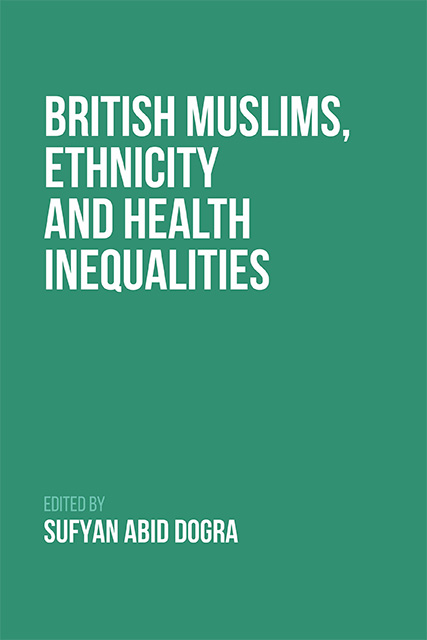2 - COVID-19, Health Inequalities and the Lived Experience of British Muslims
Published online by Cambridge University Press: 18 October 2023
Summary
COVID-19, Health Inequalities and British Muslims
Black and Minority Ethnic (BME) communities have been disproportionately affected by COVID-19: death rates are higher and survival rates are lower, with statistics varying in different BME communities (Public Health England 2020b). BME communities are at risk of higher infection rates and mortality rates due to certain pre-disposed health conditions and living in poorer, overcrowded housing (Meer et al. 2020). These higher infection and mortality rates together with the fear of spreading the virus or catching it from others have caused further distress. Ethnic minorities in Britain have experienced a disproportional impact of COVID-19, as for these groups the pandemic was translated as a syndemic pandemic (Bambra et al. 2020) because of pre-pandemic inequalities on all social determinants of health such as unhealthy dietary practices, poor housing and working conditions, unemployment, poor access to healthcare, high levels of inactivity and discrimination that ethnic minorities and the majority of British Muslims live with.
This chapter highlights the disproportionate impact of COVID-19 on British Muslims and how the pandemic exposed prevalent health inequalities in the UK. We critically analyse the discussions around faith in relation to COVID-19, victim blaming, its impacts and the socioeconomic consequences of COVID-19 lockdowns on marginalised British Muslims. We evaluate the vulnerabilities of British Muslims working in the NHS and healthcare and the responses by professional Muslim organisations providing healthcare awareness. We explore the interplay of ethnicity, religion and deprivation in negotiating the particular challenges of living through COVID-19. We critically evaluate and problematise the notions around ‘vaccine hesitancy’, and question the emphasis on national religious organisations of British Muslims for responses to COVID-19 instead of professional medical organisations or small-scale community-based organisations. We assess the impact of COVID-19 on British Muslim families, children, charity and voluntary organisations, physical activity, mental health and wellbeing, and how British Muslims living in deprived neighbourhoods responded to the pandemic through engaging with community groups. We highlight the work of neighbourhood and community-based organisations and services for healthcare awareness by professional Muslim groups. This chapter also includes multidisciplinary perspectives of academics and practitioners on the pandemic, lockdown, vaccination and subsequent socioeconomic implications of COVID-19 with regard to British Muslims’ lived experience.
- Type
- Chapter
- Information
- British Muslims, Ethnicity and Health Inequalities , pp. 19 - 46Publisher: Edinburgh University PressPrint publication year: 2023



